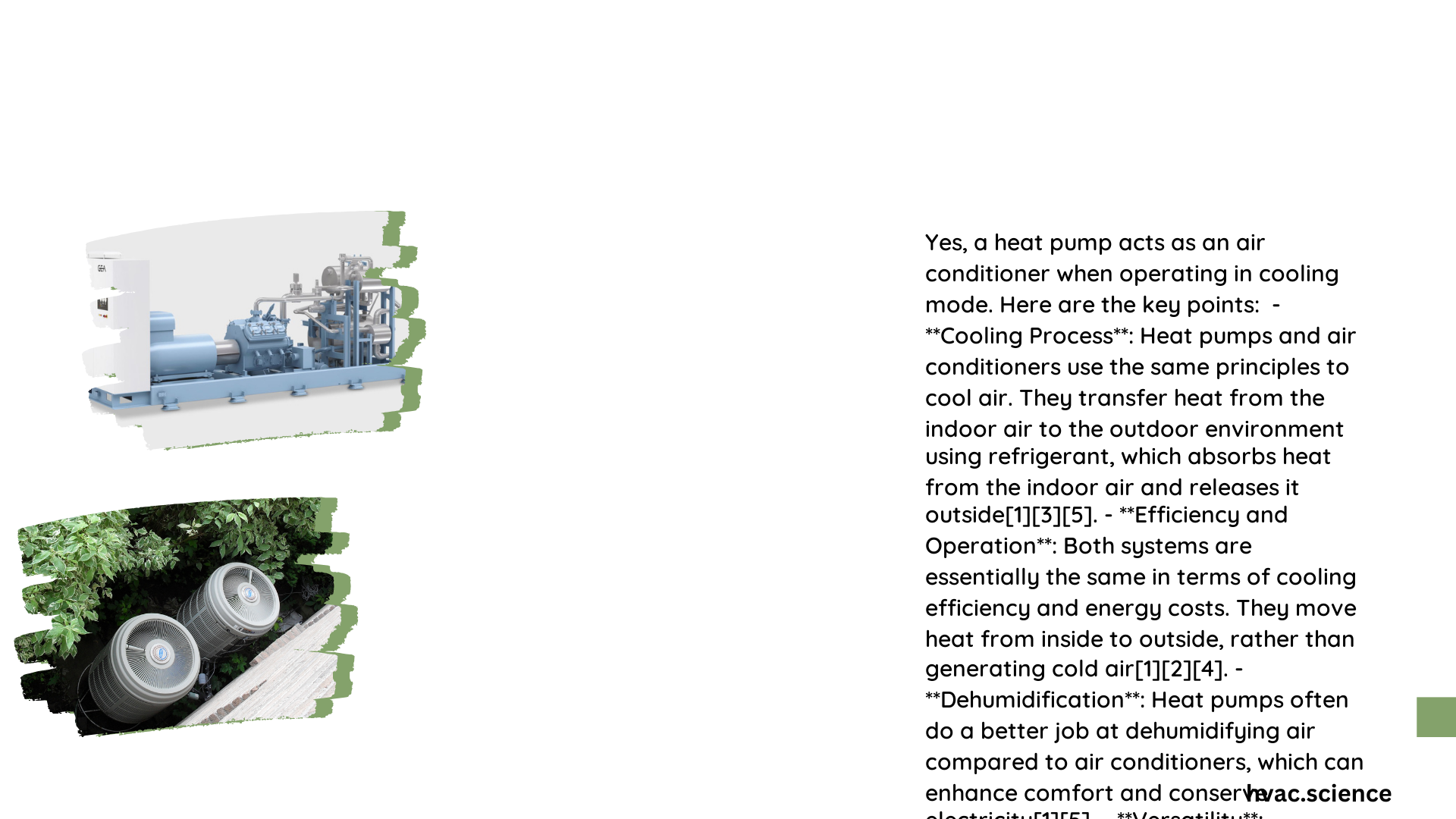A heat pump is a versatile HVAC system that can both heat and cool your home. In cooling mode, it functions similarly to a traditional air conditioner, extracting heat from indoor air and transferring it outside. This dual functionality makes heat pumps an efficient choice for year-round climate control. However, their operation, efficiency, and maintenance requirements differ slightly from standalone air conditioners.
How Does a Heat Pump Cool Your Home?
A heat pump in cooling mode operates on the same principles as an air conditioner. It uses a refrigeration cycle to move heat from inside your home to the outside. Here’s a breakdown of the process:
- The indoor unit’s evaporator coil absorbs heat from your home’s air
- Refrigerant in the coil turns from liquid to gas as it warms
- The compressor pressurizes the warm refrigerant gas
- The outdoor unit’s condenser coil releases the heat outside
- The cooled refrigerant returns to the indoor unit to repeat the cycle
This continuous cycle effectively cools your home by removing heat and humidity from the indoor air.
What Are the Key Components of a Heat Pump’s Cooling System?

A heat pump’s cooling system consists of several crucial components:
- Evaporator Coil: Located in the indoor unit, it absorbs heat from your home’s air
- Compressor: Pressurizes the refrigerant, raising its temperature
- Condenser Coil: Found in the outdoor unit, it releases heat to the outside air
- Expansion Valve: Controls refrigerant flow and pressure
- Reversing Valve: Allows the system to switch between heating and cooling modes
These components work together to efficiently transfer heat and cool your home.
How Does a Heat Pump’s Efficiency Compare to a Traditional Air Conditioner?
Heat pumps and air conditioners are both rated using the Seasonal Energy Efficiency Ratio (SEER). Generally, their cooling efficiencies are comparable:
| System Type | Typical SEER Range | ENERGY STAR Minimum SEER |
|---|---|---|
| Heat Pump | 13-21 | 15 |
| Air Conditioner | 13-21 | 15 |
However, heat pumps offer additional benefits:
- Year-round climate control (heating and cooling)
- Potentially lower overall energy costs
- More environmentally friendly operation
What Are the Advantages of Using a Heat Pump for Cooling?
Using a heat pump for cooling offers several advantages:
- Dual Functionality: Provides both heating and cooling in one system
- Energy Efficiency: Can be more efficient than separate heating and cooling systems
- Cost Savings: Potential for lower energy bills, especially in moderate climates
- Environmental Impact: Uses electricity instead of fossil fuels, reducing carbon footprint
- Dehumidification: Effectively removes humidity from indoor air
These benefits make heat pumps an attractive option for many homeowners.
Are There Any Limitations to Using a Heat Pump as an Air Conditioner?
While heat pumps are effective cooling systems, they do have some limitations:
- Climate Sensitivity: May struggle in extreme temperatures
- Initial Cost: Higher upfront investment compared to standalone AC units
- Maintenance: Requires regular servicing for optimal performance
- Refrigerant Leaks: Can be more problematic due to year-round operation
- Noise: Some models may be louder than traditional air conditioners
Consider these factors when deciding between a heat pump and a traditional air conditioner.
How Do You Maintain a Heat Pump for Optimal Cooling Performance?
To ensure your heat pump cools effectively, follow these maintenance tips:
- Clean or replace air filters monthly
- Keep outdoor unit clear of debris
- Schedule professional maintenance twice a year
- Check refrigerant levels annually
- Clean indoor and outdoor coils as needed
- Inspect ductwork for leaks or damage
- Ensure proper insulation around the home
Regular maintenance helps maintain efficiency and extend the system’s lifespan.
What Should You Consider When Installing a Heat Pump for Cooling?
When installing a heat pump for cooling, consider the following:
- Proper Sizing: Ensure the unit is correctly sized for your home
- Location: Place the outdoor unit in a shaded, well-ventilated area
- Ductwork: Evaluate existing ductwork or consider ductless options
- Insulation: Improve home insulation for better efficiency
- Climate: Choose a model suitable for your local climate
- Professional Installation: Hire a qualified HVAC technician for proper setup
These factors can significantly impact your heat pump’s cooling performance.
How Does the Cost of Cooling with a Heat Pump Compare to Traditional Air Conditioning?
The cost comparison between heat pump cooling and traditional air conditioning depends on several factors:
- Initial Investment: Heat pumps typically have higher upfront costs
- Energy Efficiency: Heat pumps may offer lower operating costs in moderate climates
- Maintenance Costs: Similar for both systems, but heat pumps require year-round care
- Lifespan: Heat pumps and air conditioners have comparable lifespans (10-15 years)
- Utility Rates: Local electricity costs affect operating expenses
In many cases, the long-term savings of a heat pump can offset the higher initial investment.
In conclusion, a heat pump does indeed act as an air conditioner when in cooling mode. It offers efficient cooling along with the added benefit of heating capabilities, making it a versatile choice for year-round climate control. While there are some considerations and limitations, many homeowners find heat pumps to be an effective and cost-efficient solution for their cooling needs.
References:
1. How a Heat Pump Works | HVAC – Goodman
2. How Does a Heat Pump Work? – Energy Star
3. What is a Heat Pump And How Does It Heat And Cool? – Trane®
4. Heat Pumps – Department of Energy
5. Heat Pump Systems – EPA
